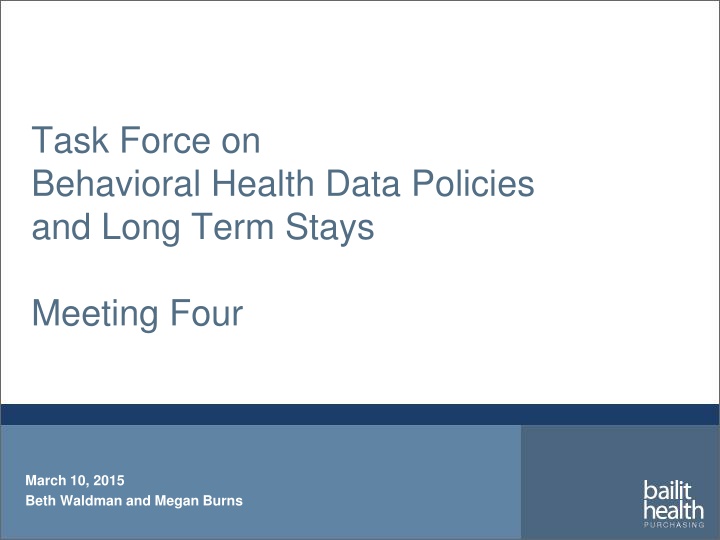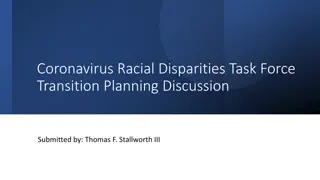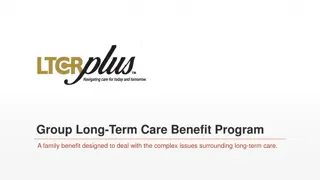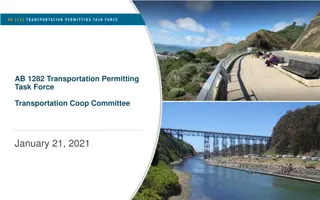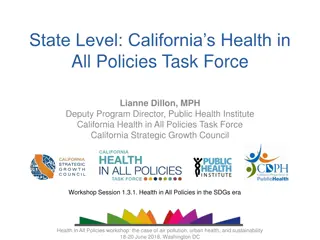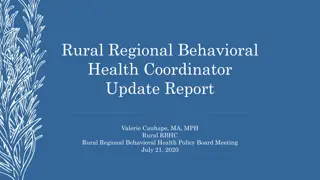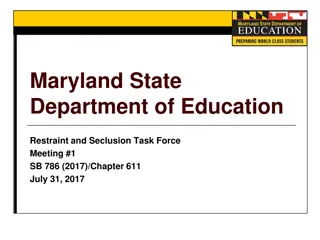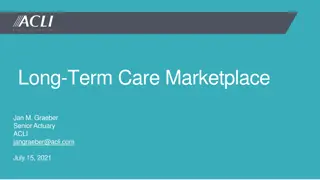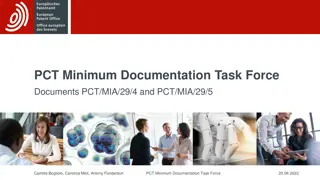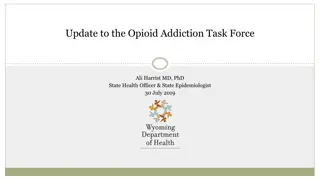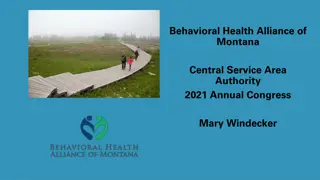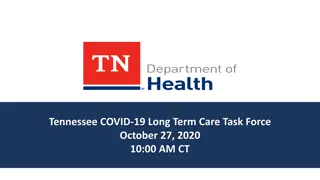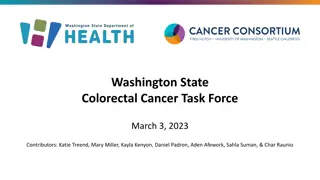Task Force on Behavioral Health Data Policies and Long Term Stays Meeting
This content provides information about the Task Force on Behavioral Health Data Policies and their discussions on reducing the length of stay in the Emergency Department for patients with behavioral health diagnoses. Recommendations and actions taken during meetings are highlighted, focusing on improving care for patients awaiting placement. Various strategies, including enhancing data collection and implementing ED processes, are discussed to address the challenges faced by ED boarders.
Download Presentation

Please find below an Image/Link to download the presentation.
The content on the website is provided AS IS for your information and personal use only. It may not be sold, licensed, or shared on other websites without obtaining consent from the author.If you encounter any issues during the download, it is possible that the publisher has removed the file from their server.
You are allowed to download the files provided on this website for personal or commercial use, subject to the condition that they are used lawfully. All files are the property of their respective owners.
The content on the website is provided AS IS for your information and personal use only. It may not be sold, licensed, or shared on other websites without obtaining consent from the author.
E N D
Presentation Transcript
Task Force on Behavioral Health Data Policies and Long Term Stays Meeting Four March 10, 2015 Beth Waldman and Megan Burns
Agenda Welcome 9:30 am 9:40am Public Comment on ED Boarding 9:40 am 9:55 am Long Term Stays: ED Boarding 9:55am 11:40am Public Comment on Measures / Data 11:00am 11:10am Review of Measures Matrix and Data Needs 11:10am 11:55am Next Steps 11:55am noon 2
February 26 Meeting Recap We discussed several recommendations related to reducing the LOS in the Emergency Department of patients with behavioral health diagnoses. Recommendations that we will begin to flesh out for future consideration include, but are not limited to: Endorsing the Special Commission s Bed finder report Increasing reimbursement for difficult to manage psychiatric inpatient admissions and increasing the number of difficult to manage beds in the system Identifying an APM for behavioral health, that might include ensuring weekend admissions / discharges in all levels of care. As a result of the meeting, a multi-stakeholder group will identify potential recommendations related to notifying plans about ED boarders and bring it back to the Task Force for consideration. 3
Continuing the Discussion At end of the meeting, we were viewing the ED boarding issue through the lens of the patient waiting in the ED. What care can be delivered while they are waiting in the ED? We have had follow-up discussions with Mark Pearlmutter and Greg Harris What recommendations could potentially resolve the issues around boarders without doctors? We will also discuss: Do all stakeholders have what is necessary to define and measure the problem? Other recommendations, not previously discussed. 4
Do these recommendations help ED boarders receive the care they need while awaiting an available bed? ED Processes / ESP Services: For EDs with no / little psych support at a minimum have telepsych consultations, contract with an ESP or psych consultation service. (55) ED Alternatives Consideration of Taunton State hospital or other sites for pilot programs that divert high acuity and dual diagnosis patients away from EDs. (18) Increase use of separate but adjacent psychiatric EDs within the hospital. (38) Create post-ED crisis pod that would serve to care for patients needing emergent mental health care pre-inpatient stay or in lieu of inpatient stay. (TFM) 5
Does this recommendations help stakeholders to define, measure and act upon ED Boarding? Recommendation: Improve data collection by EDs on ED boarders, their insurance status, clinical status and reasons for boarding. Share data with DPH and with insurers (for their members) (New) Potential dashboard measure: Number of patients in the emergency department that are ready to be discharged or admitted but unable to leave ED because they are waiting for available care in either the community or hospital. 6
Other Recommendations For Group to Consider? Are there other specific recommendations that you d like the group to discuss today? 7
Before it started snowing. In December, we discussed our goal to develop measures that would help the legislature assess the performance of the behavioral health system and to inform its investments of resources. We presented measures for consideration and collected your feedback. 8
Review of Dashboard We tied specific data needs and priorities to the measures we discussed in December. We asked for your feedback in prioritizing the measures, the frequency with which the data should be collected and other considerations. Refer to paper copy of the dashboard. 9
Measure Questions for Review 1. Which are the most important measures in each topic area? 2. What type of data will the measure provide? 3. Why is this measure important to understanding the overall outcomes of the behavioral health system? 4. Will policy makers be able to use the measure to make informed policy and funding decisions? 5. How costly is the measure to collect? 6. Is the cost worth the information the measure will glean? 7. Are there other ways to get this information? 10
Incorporating the Pediatric Population In February 2010, CMS awarded Massachusetts with one of ten quality demonstration grants funded through CHIPRA in an effort to improve health care quality and delivery systems for children enrolled in Medicaid and CHIP. Five partner organizations (MassHealth, Boston Children s Hospital, Massachusetts Health Quality Partners, National Institute for Children s Health Quality, and the University of Massachusetts Medical) came together to establish the Massachusetts Child Health Quality Coalition. 11
MA Child Health Quality Coalition BH Measures Work Facilitated the development of measures of care coordination for children and youth with behavioral/mental health diagnoses. Provided expertise to support measure review and selection. Led measure development process, resulting in a group of nine measures (see separate handout) approved for testing. Potential Recommendation: Incorporate the nine pediatric behavioral health measures directly into final dashboard recommended by the Task Force. 12
Data collection and sharing efforts by different state agencies Bailit held a meeting with state agencies on 1/18 to identify issues across state agencies with data sharing. Attending agencies Center for Health Information and Analysis (CHIA), Health Policy Commission (HPC), MassHealth, Department of Public Health (DPH - Bureaus of Substance Abuse Services (BSAS) and Health Planning); Department of Mental Health (DMH), Division of Insurance (DOI), Attorney General s Office (AGO) 13
Key Findings from State Agencies Meeting Agencies devote significant resources to data collection and data analysis today There is a clear recognition of agencies of need to work together on some long standing and difficult to solve issues, including: Can't follow member through state agencies Different terms used by different agencies Privacy constraints: federal state law and agency policy 14
Potential Recommendation for Discussion Establish an ongoing state-based data work group charged with: Resolving the barriers to sharing data across agencies, including: Linking data and systems so that individuals can be followed through the different agencies for better program coordination and outcome tracking Setting standard definitions for common data metrics Resolving state-level privacy data issues, including review of existing state laws Streamlining the data reporting requests from external parties As envisioned, work group would be established from the Governor s office and include representatives from all health care policy and program related agencies 15
Upcoming Meetings March 24th: 9:30 noon: Focus on Long Term Stays (inpatient and DMH continuing care facilities) April 28th: 9:30 noon: Topics will probably cover both charges and an initial review of recommendations Location for all remaining meetings: CHIA 501 Boylston Street 5th Floor, Newbury A & B 16
Contact Information For any questions contact: Beth Waldman: Megan Burns: Joe Vizard: bwaldman@bailit-health.com or 781-559-4705 mburns@bailit-health.com or 784-559-4701 joseph.vizard@state.ma.us or (new) 617-701-8313 17
